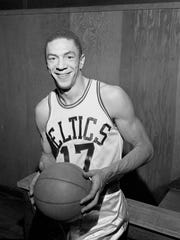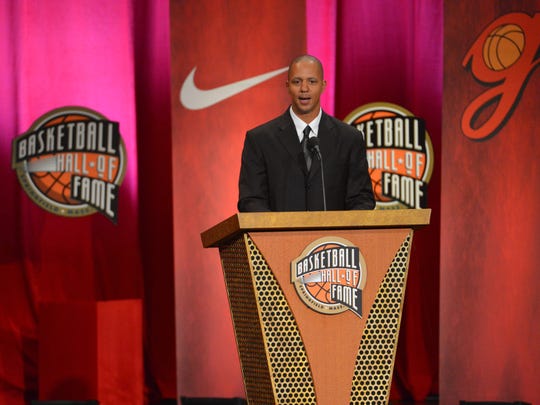Don Barksdale is one of the most important NBA pioneers you never heard of
During Black History Month, with the series 28 Black Stories in 28 days, USA TODAY Sports examines the issues, challenges and opportunities Black athletes and sports officials face after the nation’s reckoning on race in 2020.
Maybe you’ve heard of Don Barksdale, maybe you haven’t.
Regardless, you need to know his important story.
Barksdale is the NBA’s first Black All-Star, voted on the East team by other players in 1953.
Barksdale’s NBA career was short, just four seasons, because Black players were prevented from playing in the league until 1950.
While not as famous as some of his pioneers of the era – such as baseball’s Jackie Robinson, MLB’s first Black player, and basketball’s Earl Lloyd, the NBA’s first Black player – Barksdale was influential.
He was also the first Black player to play for the U.S. Olympic basketball team, winning a gold medal at the 1948 London Games, and became the first Black player named to the consensus All-America team in 1947 while at UCLA.
Barksdale died in 1993 at 69 years old.
“Don was one the of the best,” former San Francisco 49ers coach Bill Walsh said in the documentary "Bounce: The Don Barksdale Story." “He was way ahead of this time. He had great moves – under the basket, outside, got way up above the rim.”
Because Black players were not allowed in the NBA until 1950, Don Barksdale only had a four-year professional career. (Photo: ASSOCIATED PRESS)
In those four seasons – two with the Baltimore Bullets and two with the Boston Celtics, just two years before Bill Russell arrived – Barksdale averaged 11 points and eight rebounds with his best season coming in 1952-53 at 13.8 points and 9.2 rebounds per game.
“Unfortunately, I was 29 or 30 when I turned pro because the NBA had been closed to blacks for so long,” Barksdale told LA84 Foundation in 1991. “I had lost three or four good years that I could have been playing. I do not think I ever reached my potential in pro ball.”
Of his time and ahead of his time, Barksdale embodied "More Than An Athlete" seven decades before it became a slogan and action item .
Barksdale was a businessman, entrepreneur, music industry insider, real estate investor and philanthropist.
Born in Oakland, California, in 1923, Barksdale was the son of Mississippians who headed West as part of the great migration from the south that Isabel Wilkerson documented in her Pulitzer Prize-winning book, "The Warmth of Other Suns."
That didn’t make Barksdale immune from racism and a Jim Crow-like system. Though he attended a desegregated high school, only one Black player was allowed on the basketball team, and Barksdale never made the team.
He still loved the game and played at parks, developing skills that caught the attention of a coach at Marin Junior College. After two seasons at Marin, UCLA noticed, and Barksdale was offered a scholarship. In a weird sequence, he played eight games for UCLA in the winter of 1943, and after the season, he was summoned to serve in the Army in World War II. Barksdale returned to UCLA for the 1946-47 season.
Following college, he played for AAU teams, which were hugely popular at the time, and then was named to the Olympic team. There he played for U.S. assistant coach and Kentucky coach Adolph Rupp, who among many things is known for racist language and a reluctance to recruit Black players to Kentucky.
“I started out with a very stormy relationship with Adolph Rupp,” Barksdale told the LA84 Foundation. “When we came back on the (S.S.) America, which is the ship that transported all the athletes in '48, he made it his business to wait for me at the gangplank when we embarked at New York. In addition, he told me that it was a pleasure coaching me in his first experience working with a Black player.”
Derek Barksdale speaks on behalf of his father Don Barksdale, who was inducted in the Basketball Hall of Fame in 2012.
During his playing days, Barksdale endured racism. He received death threats and was unable to stay in hotels or eat at restaurants with his white teammates.
He also understood his path to financial freedom would not be in basketball. In college, he opened a record store, one of the few Black record shops in Los Angeles at the time. He also worked as a prominent and popular DJ, became a beer distributor, opened entertainment clubs – where some of the best Black musicians and entertainers performed – and owned real estate.
“I had studied business at UCLA and had learned that real estate was a good investment,” he told LA84. “The advice was, ‘Buy property and do not sell it.’ When I played pro ball I would buy a piece of property every year and it was the smartest move I ever made in my life. Right now I am set for life because I bought property back in '51, '52 and '53 and I still have it.”
His work in music made him more famous than he ever was playing basketball.
“Lou Rawls and I would have an act every week in my club,” Barksdale told LA84. “The acts were Lou Rawls, B.B. King, Ike and Tina Turner, Redd Foxx, Richard Pryor, Jackie Wilson, the Whispers, the Pointer Sisters, Count Basie, Joe Williams, Arthur Prysock. They were all unbelievable acts. They would receive airtime on R&B stations, but the white stations would not play them. As a result, we knew them, but the Caucasians did not know them. These acts were mine for four or five years."
When Oakland Public Schools encountered financial difficulties that threatened sports in the 1980s and '90s, Barksdale started the Celebrity Waiters luncheon to raise money for boys’ and girls’ sports. He enlisted his friends from sports and entertainment to wait on tables: Rawls, King, Walsh, Willie Mays, Al Attles, Ronnie Lott, Ollie Matson. He raised $1 million for his Save High School Sports Foundation.
Former NBA players Gary Payton and Antonio Davis, who played prep basketball for Oakland public schools, were beneficiaries of Barksdale’s efforts.
“When I got to know him and finally saw what he was trying to do, I thought to myself, ‘This man maybe is a saint,’” longtime Oakland-area writer Dave Newhouse said in the Barksdale documentary.
Now, you know a little bit about Don Barksdale.
Follow Jeff Zillgitt on Twitter @JeffZillgitt.
Source: Read Full Article


